How to Book 2016 Honda Civic Through A Bank
The long awaited Honda Civic 2016 is now finally up for reservations. In this article, I will elaborate on the reservation requirements of the new Honda Civic through a bank loan.
Also read: Here is How You Can Book 2016 Honda Civic In Pakistan Now!
First up: Documents Requirement
To pre-book the 2016 Civic through a bank, make sure you have the following documents ready,
If you are a salaried person then make sure you have:
1) A copy of your CNIC
2) 2 passport size photographs
3) Your latest original salary slip
4) Last three to six months personal bank statement, depending on your bank
5) Proof of at least one year of employment (required by some banks)
However if you run a business or are self-employed, you can be asked for the following documents by your bank:
1) A copy of your CNIC
2) 2 recent passport size photos
3) Proof of business
4) Last six months’ bank statement
5) Proprietorship letter
6) NTN certificate
7) Last two years’ tax returns
Once you have your documents ready, visit your bank’s branch for the application form. After filling the lease application form for 2016 Honda Civic, get it submitted with the required documents and wait for approval by your bank. Approval may take up to fifteen days.
Next: Eligibility Criteria
Like with every lease, there is a particular eligibility criterion set by the bank. Pakistani Nationality is compulsory for both salaried and self-employed applicants for the loan. The age bracket for salaried individuals is between 22-60 years of age and 22-70 years for self-employed applicants. Requirement of the minimum monthly income depends on the policy of your bank and tenure of your lease.
Have a look: Honda Issues Booking Guidelines & Pricing for 2016 Civic!
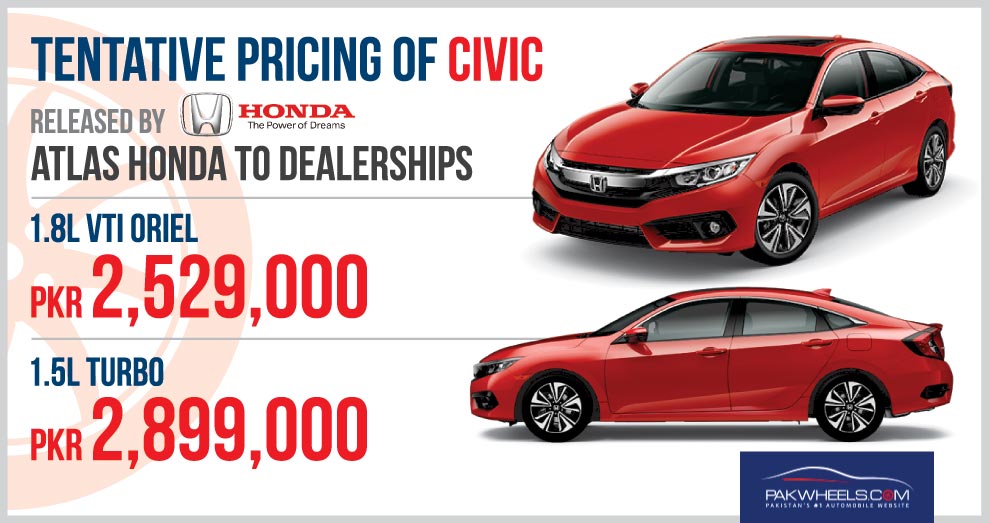
Who Do you Need to pay the Down Payment; Your Bank or Honda Atlas?
Down payment has been the most confusing element of 2016 Honda Civic’s booking since there are two different types of down-payments in the case of reserving the new Civic, as Honda requires a 50% down-payment to process your reservation so the question arises as to how will your bank process your down payment. After consulting with my bank, I have confirmed that to book through a bank; you will need to deposit partial down payment for the overall price of 2016 Honda Civic which is between 20-50% of the total price tag to your bank without the need of paying partial payment to Honda Atlas.
Down payment amount:
Honda Civic 1.8-liter VTI Oriel: Between PKR 500,000 and PKR 1,270,000
Honda Civic 1.5-liter VTEC Turbo: Between PKR 580,000 and PKR 1,450,000
Once you have deposited the down payment to your bank, your new Civic will be reserved by Honda Atlas.
Estimated Installments:
Monthly installments depend on multiple factors i.e. the car’s total price, tenure of lease, bank rate of interest, down payment and etc. So to simplify the process of calculating the EMI for your new Honda Civic, PakWheels have made a car loan calculator which you can use to find out the estimated monthly installments of your car by simply filling in the required information. You can use our Car Loan Calculator by clicking here.
Please note: This post serves as a general guide, the applicability of information/prerequisites contained in this article may vary depending on your bank and the car dealer.

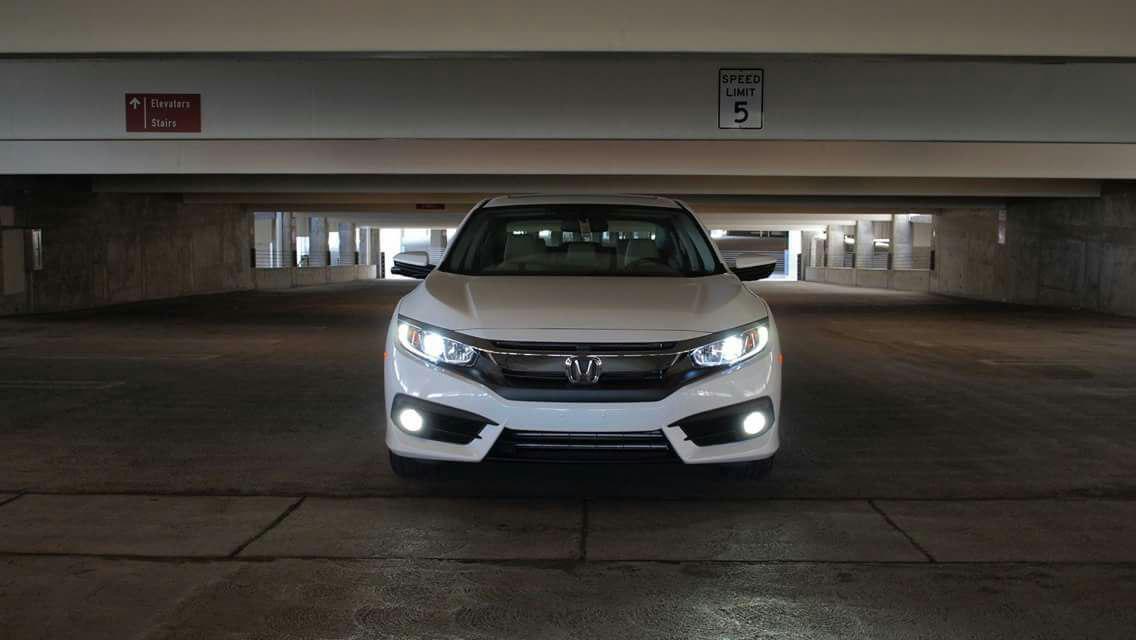
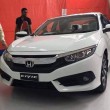

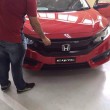
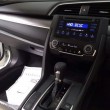

interest is haram! banks will lead you to fire! try to buy on cash otherwise have patience!
You could avoid the conventional bank, go through the islamic bank, in fact their terms & conditions are better, so even if you are non-muslim or do not care about the teachings about riba, it is better to go for islamic bank.
my dear friend there’s nothing like Islamic banking.. markup is always there!
go and read a detailed book about it. changing the name doesn’t change the characteristics!
How will you sustain to run a business without profit? Opening a business IS FOR profit dude, not for an imaginary god’s charity.
o well.. its up-to you!
there is a difference between sud and profit!
its a debate.. people only go with what they find right!
Markup is not haram. Interest is haram. These are two different things. Don’t mix them up. The real issue is insurance company but if the insurance company is approved by islamic scholar then you are fine. (Insruance is not problem but invenstments made by insurcane comapny in stock market is problem, so if they invested according to islamic laws then it’s fine)
Do you equate Islamic banking only with avoidance of interest (riba)?
There are many aspects of Islamic banking, e.g. Islamic bank will not lend money to build a liquor factory. If you dial the helpline of Meezan Bank (for example), the recording is played back in a man’s voice, because woman’s voice is supposedly unislamic.
Therefore in the first place, being totally fixated by riba only is kind of tunnel vision. There are many more things to Islamic banking, and riba avoidance is a big element of the subset but not the only one.
Now come to your claim that there is nothing like Islamic banking. Previously, it was kind of ridiculous because they would say, we don’t call it “interest”, we just call it with a different name like “markup” or “profit”. It was laughable and a deception.
But recently there is more and more Islamic banking, under the push of State Bank of Pakistan. Major work has been done on accounting standards for Islamic finance in Malaysia, UK & Pakistan only. In the gulf countries, the situation is still the same, cheating people by giving the dirty old thing under a fancy new Islamic/neutral name.
Now in Pakistan, even the conventional banks have Islamic branches, the book building, staffing, accounting, each and everything is totally separate from the conventional banking department of the same bank. But if you do not trust the Islamic banking services of conventional banks, there are 6 Islamic banks (which are Islamic by incorporation and as such their branding) and you can us their service.
About the car-leasing: It is a kind of rental program with transfer of ownership, each installment has 2 parts, one is rent for that month and the other is a certain amount of money which is partial payment of that car. Therefore you use the bank’s car each month, you give them rent. And you are slowly paying for it to become yours.
Another aspect in Islamic banking: The rent+purchase arrangement means bank is not lending you the money to buy the car. Bank is first buying the car, then it is selling you a car it owns; as per Islamic finance, you cannot sell something you do not own, neither you can take rent for something you do not own.
Therefore, the delivery of car will be given to you by the bank! Not by the car dealer! If the bank is not doing this, maybe they are avoiding the riba, but at least one aspect of the business deal is still unislamic! That is what I said, that do not get totally fixated with riba, there are other aspects of Islamic finance which are equally important, should be transparent, and conventional banking would not cater for that, as the difference between conventional banking and Islamic banking is not only of riba.
I must state that current state of affairs of Islamic banking is not ideal. It is not 100% Islamic. But SBP is pushing and so are the other international institutions who are conducting research. As conventional (interest-based) banking was gearing up during the past few centuries, Islamic finance was totally ignored. Now there’s a lot of research work that is pending (backlog). I for one use and support the institutions of Islamic finance because only if they generate revenue, they will have enough money to sponsor further R&D on Islamic finance products & services, making those services more and more Islamic (ideal or nearest to 100% Islamic).
But if all of us completely shun whatever 40, 50 or 60% Islamic-pana we are getting, the institutions cannot support further research because how will they fund it (practical research with real data, not some theoretical data generated using the financial statements of conventional banks – real data will come when real transactions are dome through Islamic banking ecosystem)?
Abs123, yours is a kind of common argument, but in the Quran is clearly stated that they call riba as trade, but riba is different from trade as trade grows and riba diminishes.
The verse is usually described from the aspect of afterlife (which may be imaginary according to your belief, I am not challenging your belief, you have the freedom to believe whatever you want). But from the aspect of believer, he/she may realize that if he/she goes against the instruction of God (imaginary for you but real for the person who wants to believe in the unseen God), he/she will suffer in the everlasting afterlife (diminishing), and if he/she goes for trade, he/she will b rewarded in the everlasting afterlife (growth).
But if you see from the earthly perspective, then interest causes “time value of money”. Time value of money is a basic topic taught in Economics-101. Time value of money actually diminishes the value of money against commodities and purchaseables. Therefore the verse comes true, that interest actually diminishes the value of money. On the other hand, trade increases the supply, makes commodities cheaper, not expensive. Therefore, trade has an effect of growth of money and interest has the effect of diminishing!
———————————————————————————-
About your question, how to run a business without profit?
Ans 1. Not all businesses are for-profit. There are many businesses which are not-for-profit (NPO), their purpose is to break-even.
Ans 2. You can observe in many countries, government companies are always in loss, yet the government bails them out. In the GFC of late oughties, the very big private banks were also in loss, actually going bankrupt, the governments pulled them out. So, even if the business is not profitable, it can sustain.
Ans 3. The real answer of your question: Banks give interest-based loans not for their profit, but for the people who have invested their money. Banks charge money for all the effort expended as the middle-man (bringing lender and loaner in one place), managing liquidity, managing credit shortage, and a million other things. I am amazed that how you got the idea that bank is supposed to make “profit” from the interest it earns. Come on man, bank does even own any of the money it is lending out, how is it supposed to earn something out of it and “sustain” its business. Is it supposed to sustain itself over others money? Does it sound logical to you?
Ans 4. Continuation of the real answer to your question: Ever since conventional “profit” was declared unIslamic in Pakistan (declared that it violates the objectives’ resolution), SBP has been making efforts to make the economic system in Pakistan more and more Islamic. This means conducting studies and researches on Islamic teachings on finance, and it also means developing a new model for banks to operate. Therefore “SBP has encouraged the banks to move towards service-based income-generation rather than interest-based income-generation”. My words in inverted commas have been well-documented in research papers and press releases related to Islamic finance. Which is sort of logical too, as the consumer pays for the service he/she gets, instead of some other person/institution paying for it because they happen to pay interest to the bank over some loan they took, and then the bank is subsidizing the walk-in customer at the expense of those.
agreed 101%
changing the name doesn’t change the characteristics!
Yar research kar loo. Meri baat nahi manao. I did research and all ulma have same opinion unlike common opinion of people. Argument ky beghair hee fatwa dena sahi nahi.